Scroll down for English Translation
Que se passe-t-il dans le domaine des technologies de la santé en Afrique francophone ?
Les entrepreneurs d’Afrique francophone ne bénéficient pas d’un écosystème entrepreneurial en pleine expansion comme en Afrique anglophone : 84% de l’ensembles des fonds propres pour les startups africaines est concentrés au Nigeria, au Kenya, en Égypte et en Afrique du Sud 1,2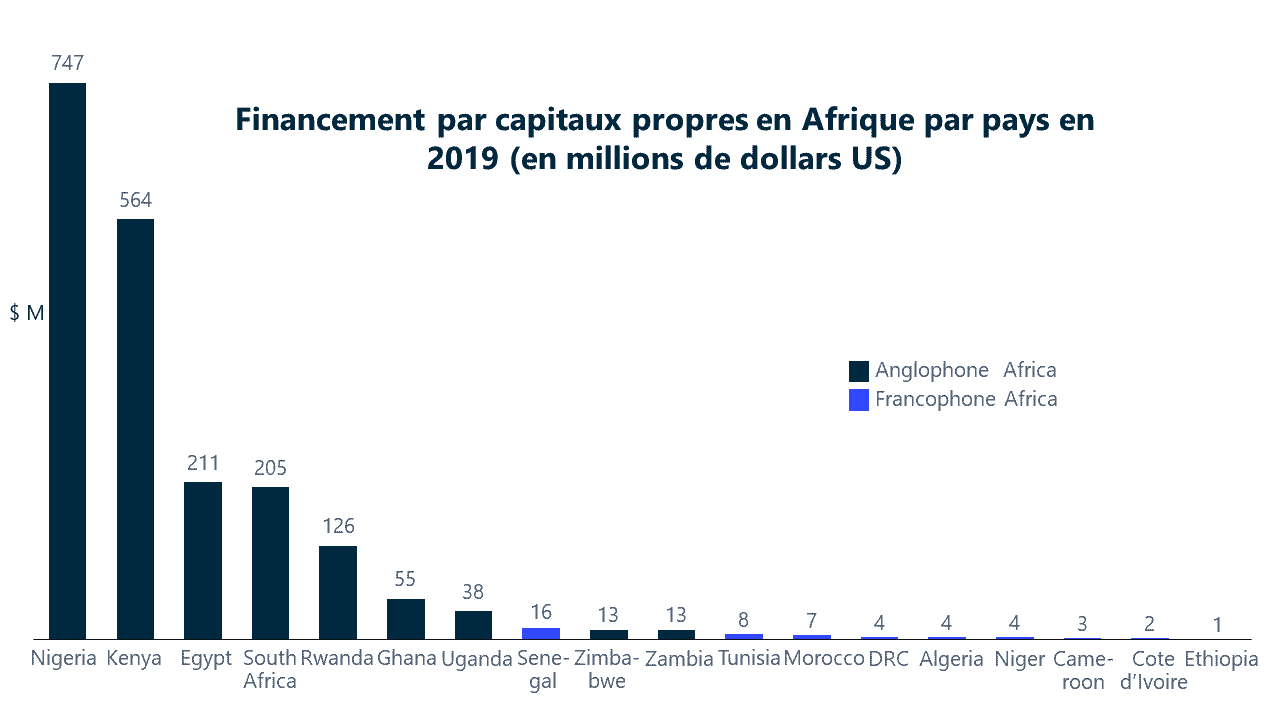
Compte tenu ces circonstances, il n’est peut-être pas surprenant que l’Afrique francophone soit souvent absente des conversations sur les innovations technologiques de la santé. Ce manque d’attention est-il justifié ? Au cours de nos recherches sur les technologies de la santé à travers le continent africain, nous avons identifié 74 innovateurs dans 12 pays francophones : Bénin, Burkina Faso, Cameroun, Congo, Côte d’Ivoire, Tchad, la République démocratique du Congo, Guinée, Mali, Niger, Sénégal et Togo.
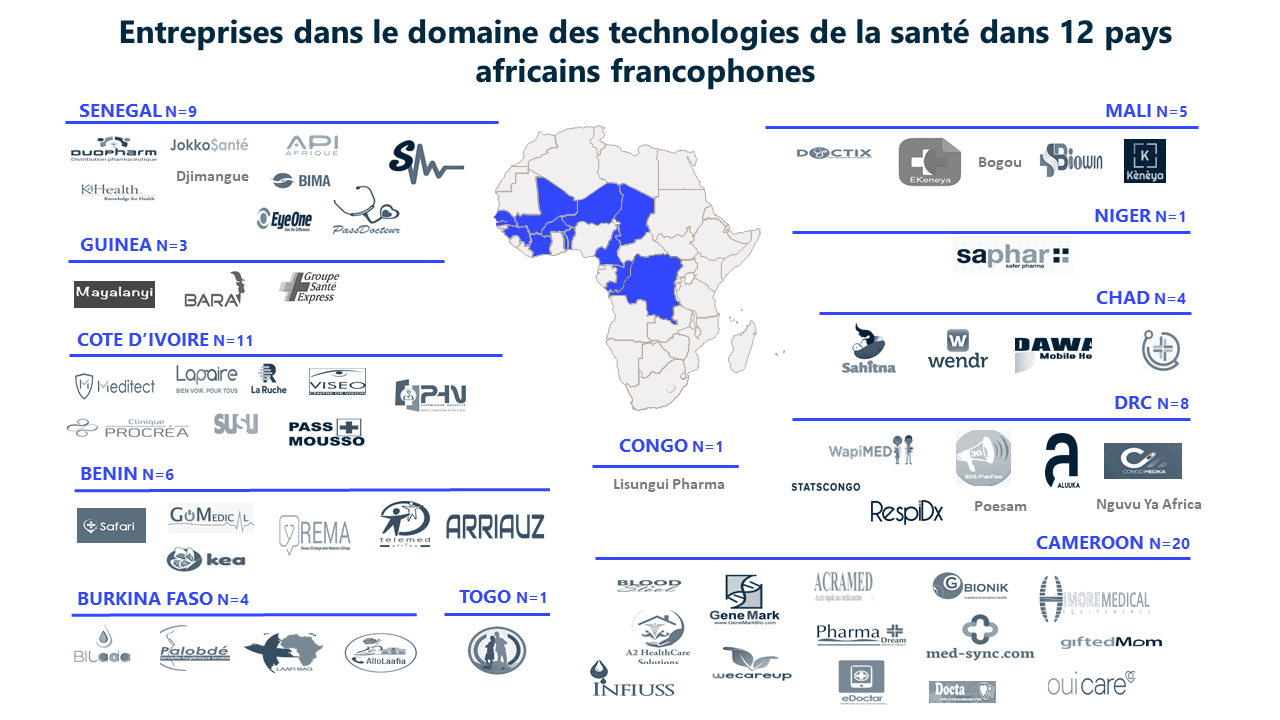
Parmi ces 74 innovateurs, 47 (64%) travaillent dans 4 pays : Cameroun (20), Côte d’Ivoire (10), Sénégal (9) et la République démocratique du Congo (8).
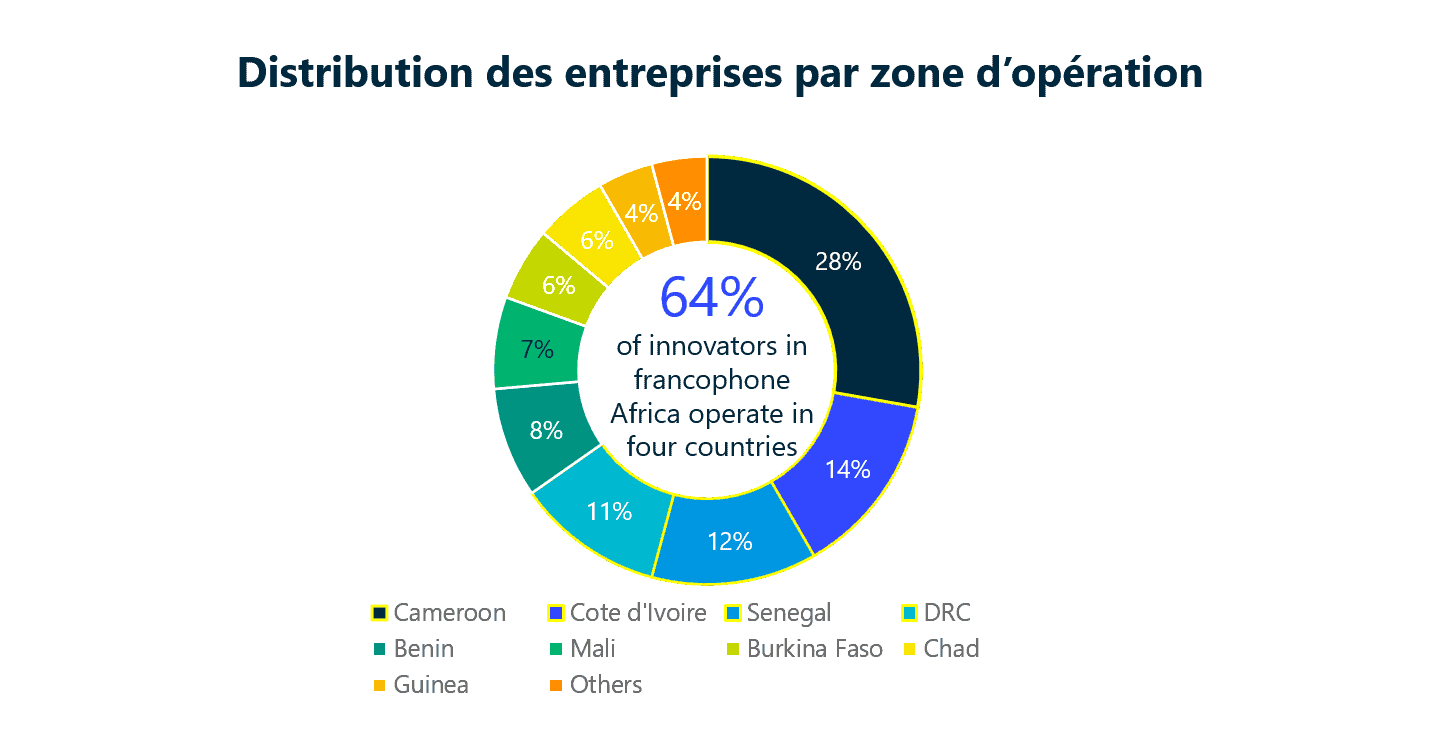
47% des entreprises proposent des services de la gestion de données patients « health management/patient database management », la diffusion de l’information sur la santé « health information », ou la prise de rendez-vous « appointment and bookings ». Les autres entreprises offrent des services incluant des innovations dans les technologies portables « consumer wears/devices » et la technologie financière « fintech ».
Environ 8 % des entreprises repérées travaillent dans la distribution de produits de santé « health product distribution ». Nous pensons que ce pourcentage est faible en raison d’une chaîne d’approvisionnement des produits de santé plus centralisée en Afrique francophone. En Afrique anglophone, les patients dépendent principalement d’une chaîne d’approvisionnement des produits de santé privée et fragmentée, où les opportunités de désintermédier la distribution sont plus fortes.
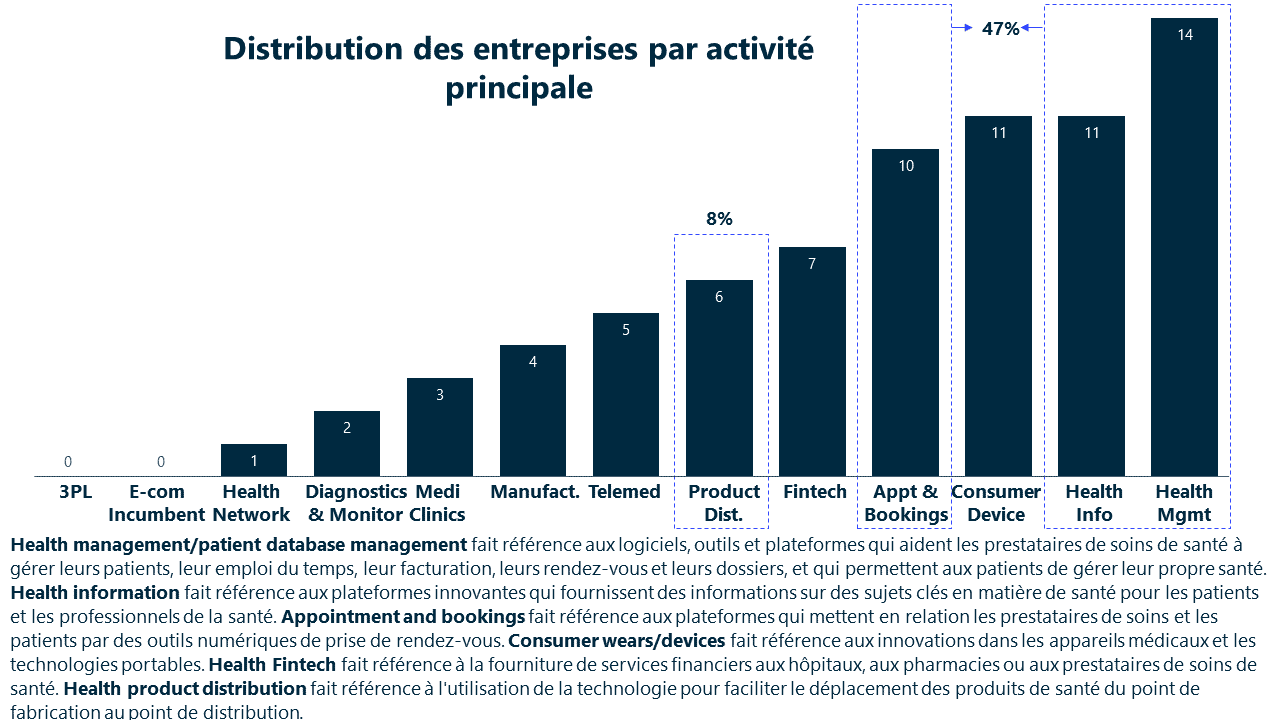
Comme les innovateurs de l’Afrique anglophone, les innovateurs de l’Afrique francophone en sont pour la plupart au stade naissant/tôt. La plupart des entreprises africaines n’opère pas au-delà du pays dans lequel elles ont leur siège social, mais certains innovateurs d’Afrique anglophone semblent s’étendre dans les pays francophones voisins.
La région reste très en retard en termes de financement. Un seul innovateur dans le domaine des technologies de la santé, Meditect, a levé plus d’un million de dollars US, ce qui souligne l’impératif de multiplier les financements dans la région. En outre, les innovateurs semblent être intéressés par les programmes d’accélération commerciale pour se développer, gagner en efficacité et avoir un impact positif sur la santé.
Dans le sillage de l’impact de COVID-19, on ne saurait trop insister sur la nécessité d’investissements stratégiques dans des systèmes technologiques innovants et rentables pour faire avancer les objectifs de santé publique. Le temps pour de tels investissements en Afrique francophone est maintenant.
What’s going on in Health Tech in Francophone Africa?
Entrepreneurs in Francophone Africa remain underserved in comparison to the entrepreneurial ecosystems in Anglophone Africa; 84% of all equity funding for African start-ups is concentrated in Nigeria, Kenya, Egypt and South Africa.1, 2
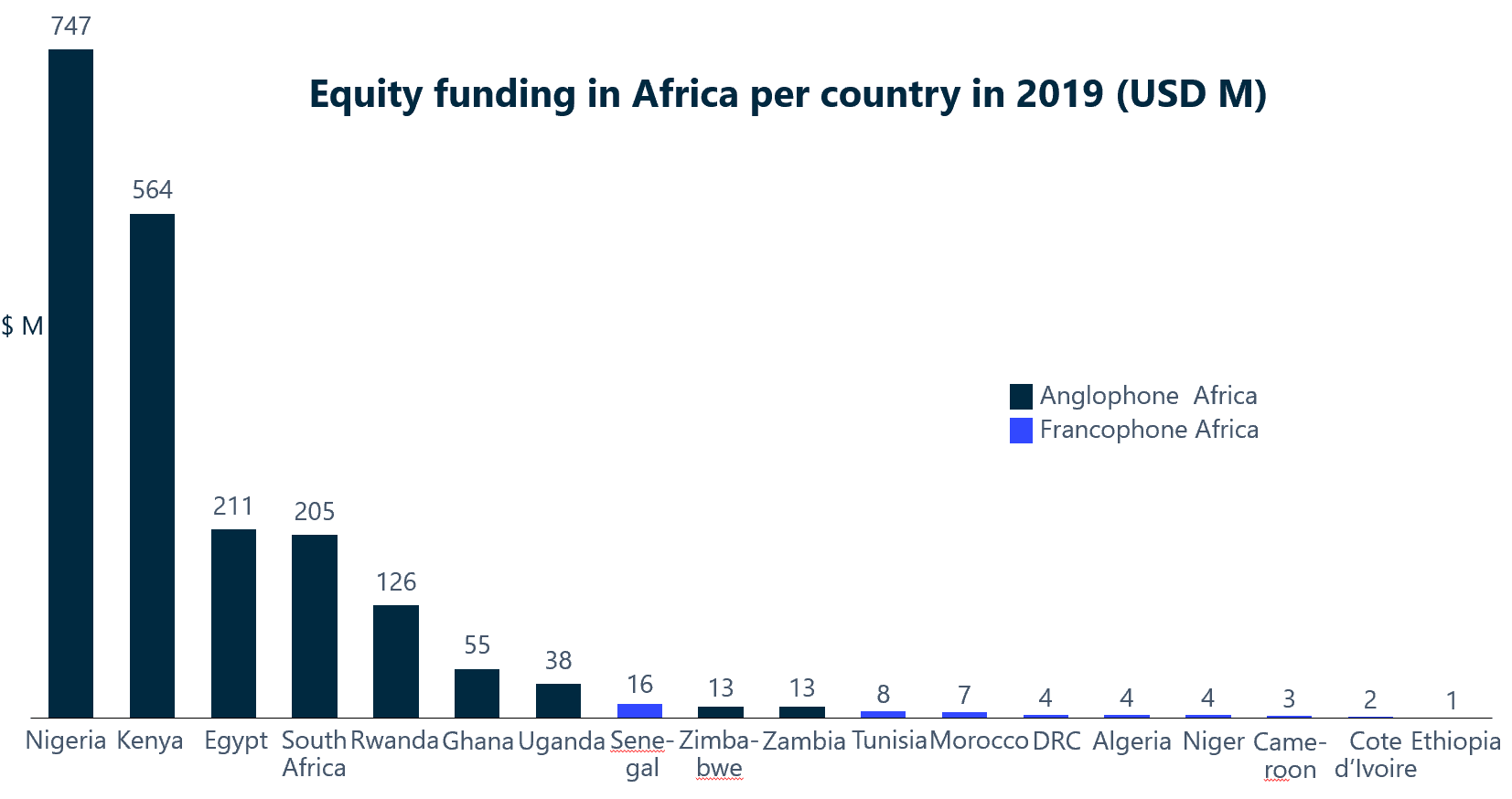
Given this broader context, it’s no surprise that Francophone Africa is often absent in conversations on tech-enabled innovations in health. However, we wondered if the lack of attention was warranted. Through a rapid landscaping exercise, we identified 74 heath-tech innovators in 12 Francophone African countries: Benin, Burkina Faso, Cameroon, Congo, Côte d’Ivoire, Chad, Democratic Republic of Congo, Guinea, Mali, Niger, Senegal and Togo.

Of the 74 innovators surfaced, 64% are concentrated in 4 countries: Cameroon (N=20; 28%), Cote d’Ivoire (N=10; 14%), Senegal (N=9;12%) and Democratic Republic of Congo (N=8; 11%).
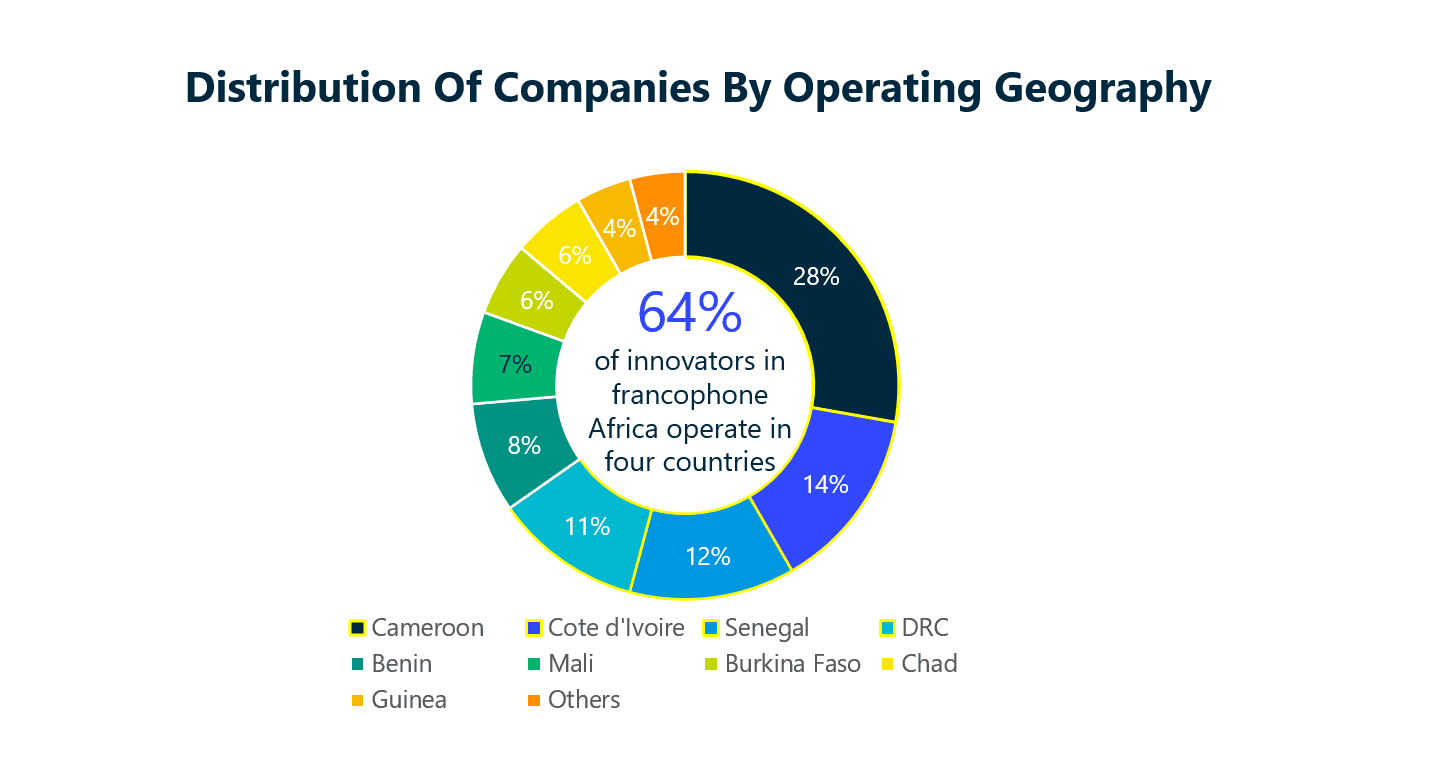
Health technology innovations in Francophone Africa appear to be dominated by companies who provide services in Health management/patient database management, Health information dissemination, and Appointments and booking with 47% of innovators offering services in these categories. Other prominent service offerings include innovations in Consumer wears/devices and health finance tech. Category definitions are below.
About 8% of companies surfaced are working in health product distribution. We theorize that fewer innovators provide this service due to a more centralized health supply chain in Francophone Africa, versus Anglophone Africa where patients rely mostly on a fragmented, multi-layered private health supply chain where opportunities to disintermediate distribution are greater.
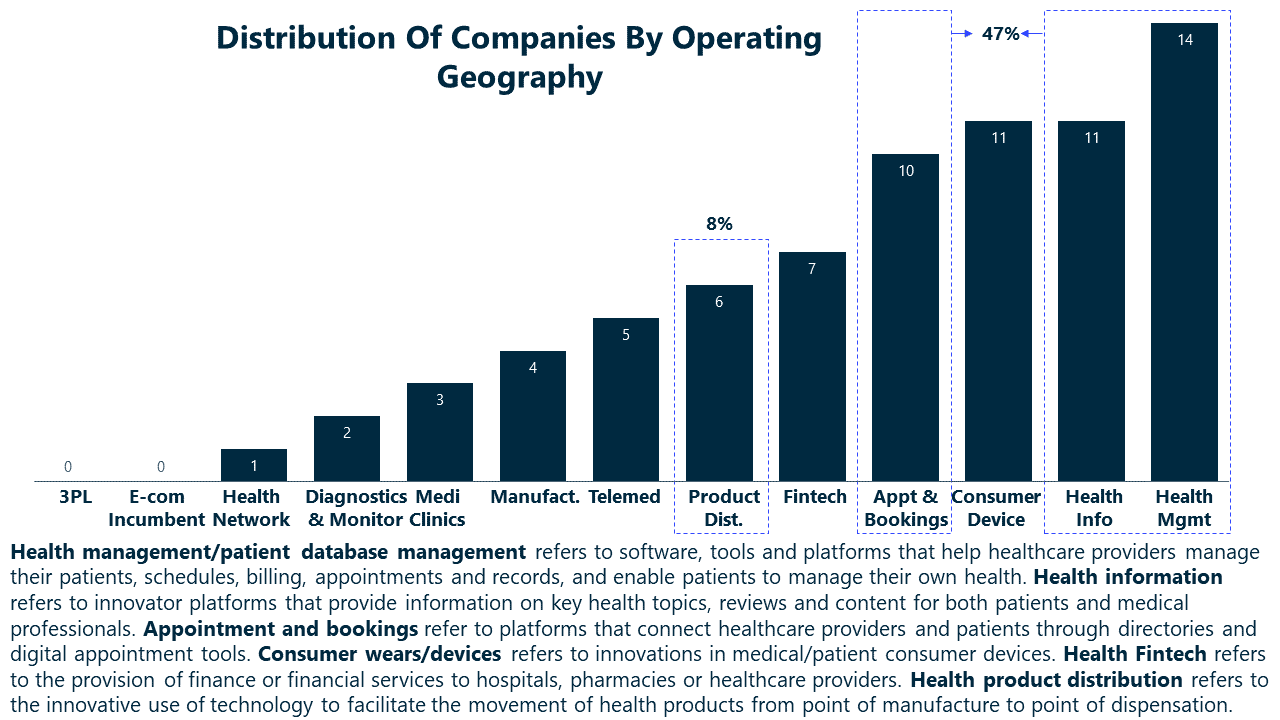
Like the Anglophone African innovators, heath tech innovators in Francophone Africa are mostly in the nascent/early stage. However, most companies appear not to have any footprint beyond the country in which they are headquartered in. Some innovators from Anglophone Africa appear to be expanding regionally to their neighbouring Francophone African countries.
The region continues to lag significantly in terms of funding. Only one health tech innovator, Meditect, is reported to have raised more than 1M USD pointing to an imperative for funding in the region.2 Additionally, health tech innovators in the region appear to be interested in commercial accelerator programs to help grow scale and efficiency with potential positive impact on public health goals.
In the wake of the impact of COVID-19, the need for strategic investments in innovative, cost-effective tech enabled systems to further public health goals in Francophone Africa cannot be overemphasized. The time for such investments in Francophone Africa is NOW.
References
1Consolate Ruagara. Francophone Africa has the most promising tech startups and they are looking for investors. World Bank. May 2019. Online access via: https://blogs.worldbank.org/psd/francophone-africa-has-most-promising-tech-startups-and-they-are-looking-investors
2Partech Africa Team. 2019 Africa Tech Venture Capital Report. Partech Partners. January 2020. Online access via: https://cdn-website.partechpartners.com/media/documents/2020.01_Partech_Africa_-_2019_Africa_Tech_VC_Report_FINAL.pdf




